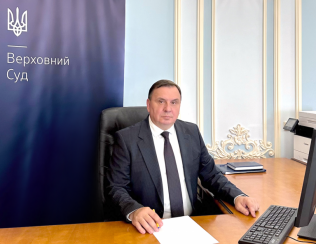Contact center of the Ukrainian Judiciary 044 207-35-46

The cooperation of the Ukrainian judiciary with the Council of Europe will help to achieve the desired results on the way to ensuring fair and impartial justice.
This statement was made by President of the Supreme Court Stanislav Kravchenko during a working meeting with Christos Giakoumopoulos, Director General of the Directorate General for Human Rights and the Rule of Law of the Council of Europe.
According to the head of the Supreme Court, since the beginning of Russia's large-scale military aggression, the Council of Europe has adjusted the areas of support for Ukraine, aligning them with its urgent needs. In particular, the Council of Europe provided the necessary expert assistance during the first months of the war, when the Criminal Code and the Criminal Procedural Code of Ukraine were amended and supplemented with provisions establishing slightly different standards for the pre-trial investigation and trial of criminal proceedings under martial law.
In addition, Stanislav Kravchenko emphasized that since the beginning of the full-scale war, the judges had been actively studying the case law of the Hague Tribunal and established international practice, as well as relevant international conventions, because they clearly understood that the decisions of Ukrainian courts should be perceived throughout the civilized world as fair and meeting the highest standards.
At the same time, the President of the Supreme Court thanked the Council of Europe for its leading role in the creation of the Register of Damage Caused by the Aggression of the Russian Federation against Ukraine, which is an important part of the international initiatives to develop a mechanism for compensation of damages caused by the aggressive war.
In connection with the discussion on the further implementation of reforms, Stanislav Kravchenko pointed out that the main problem of the judicial system was the lack of human resources. According to the President of the Supreme Court, at least a temporary simplification of the procedure for selecting judges will help to solve this problem as soon as possible.
.jpg)
Stressing that the Supreme Court is an important institutional partner of the Council of Europe, Christos Giakoumopoulos expressed his gratitude for the fruitful long-term cooperation based on mutual trust and a shared vision of further steps on Ukraine's way to the European Union.
In addition, the Director General for Human Rights and Rule of Law of the Council of Europe informed that the Council of Europe was analyzing legislative initiatives to amend the Law of Ukraine "On the Judiciary and the Status of Judges", which relate, in particular, to the introduction of a procedure for monitoring the work of the court and polygraph examinations of judges. He noted that it would be unfortunate and wrong for the legislator's reaction to one incident to undermine all the achievements of the judiciary in recent years.
He also pointed out that the Council of Europe was concerned about the staffing crisis in the judiciary and was ready to cooperate, which would include improving case management and the technical capacity of the courts, as well as developing mechanisms to reduce the workload of judges and shorten the length of case consideration. The issue of speeding up the process of filling vacancies in the judicial system undoubtedly requires considerable attention from the Council of Europe.
Another area of cooperation will be expert assistance in ensuring adequate protection of the rights of both victims of war crimes and those accused of committing them, as well as compliance with the principles of the rule of law and the principles of the Convention for the Protection of Human Rights and Fundamental Freedoms, the execution of judgments of the ECHR, and the study and relevant application of its case law.
Pavlo Pushkar, Head of Division of the Department for the Execution of Judgments of the European Court of Human Rights of the Directorate-General for Human Rights and the Rule of Law of the Council of Europe, informed about the meeting of the Committee of Ministers of the Council of Europe, which considered the issue of the execution of the ECHR judgments in the cases of Burmych v. Ukraine and Ivanov v. Ukraine.
According to him, a discussion arose in terms of different interpretations of pension legislation by the executive authorities and the courts. In view of this, there is a risk of an increase in the number of court decisions on social benefits that will not be enforced due to such discrepancies. In addition, the Committee of Ministers of the Council of Europe emphasized the problem of introducing new social payments and benefits that are not backed by budgetary allocations, and drew attention to the need to respect budgetary discipline in order to avoid new disputes.
In conclusion, Stanislav Kravchenko underscored that the Supreme Court and the Council of Europe were dependable partners who share the same objectives in carrying out the proposed strategy for further cooperation.